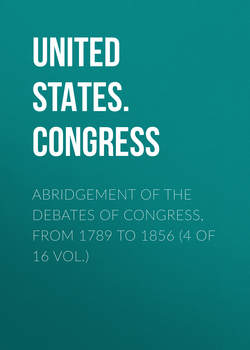Читать книгу Abridgement of the Debates of Congress, from 1789 to 1856 (4 of 16 vol.) - United States. Congress - Страница 130
ELEVENTH CONGRESS – SECOND SESSION. BEGUN AT THE CITY OF WASHINGTON, NOVEMBER 27, 1809.
PROCEEDINGS IN THE SENATE
Monday, March 12
ОглавлениеWithdrawal of Resolutions
Mr. Leib, on request, had leave to withdraw his resolutions submitted for consideration on the 8th inst.
Mr. Leib remarked that he had submitted the resolutions upon the table of the Senate under a conviction that the honor and interests of the nation required such a course of measures. He believed that it was time to have done with trifling, with a war of words, and with what had been termed gasconade; that the cup of expedients had been drained to the last dregs, and that a new mode of warfare became indispensable, to vindicate our honor and assert our rights. His impressions were, that a determined attitude alone could rescue us from the oppressor's wrong, awaken a sense of justice, or lead to that necessary alternative which an injured nation is sometimes obliged to resort to, to avoid greater calamity. He said that he was no friend to war – that peace was the first wish of his heart – but that he could not consent to preserve it by a prostitution of the attributes of freemen. Insult, robbery, and murder, cried aloud for justice or for vengeance; and duty requires of him the aid of his feeble efforts to rescue the nation from degradation. He remarked, that the resolutions were directed against one of the belligerents only, and he would assign his reasons for the discrimination, and why he had selected Great Britain for their object. It had been admitted that we had a right to choose our enemy, and Great Britain was selected, because she was first in the career of maritime despotism, and had exercised it with unrelenting severity; because she stands alone in the impressment of our citizens, and dooms them to ignominious punishment, or compels them to fight her battles; because the national honor had been vitally wounded, in the attack upon our flag; and because she had heaped outrage upon aggression, and had imbrued her hands in the innocent blood of our citizens. Since the resolutions were offered, he further remarked, the aspect of things seemed to be somewhat varied, and a hope is entertained, from the advices received, that a change of attitude may be rendered unnecessary; and that, under present circumstances, such change is inexpedient, and may prove injurious. However skeptical he might be on this subject, he had no wish to embarrass the Administration in its negotiations; but, on the contrary, he wished to give full scope to any efforts for an amicable adjustment of our differences. He wished not to throw in a cloud to intercept that glimpse which was supposed to be breaking upon us. His enmities, he said, were national, and would cease with the cause of excitement. Under these impressions, and in deference to the judgment of political as well as personal friends, to whose opinions he was always ready to render a willing homage, he said that he would withdraw the resolutions, reserving to himself the right to renew them under other circumstances.
